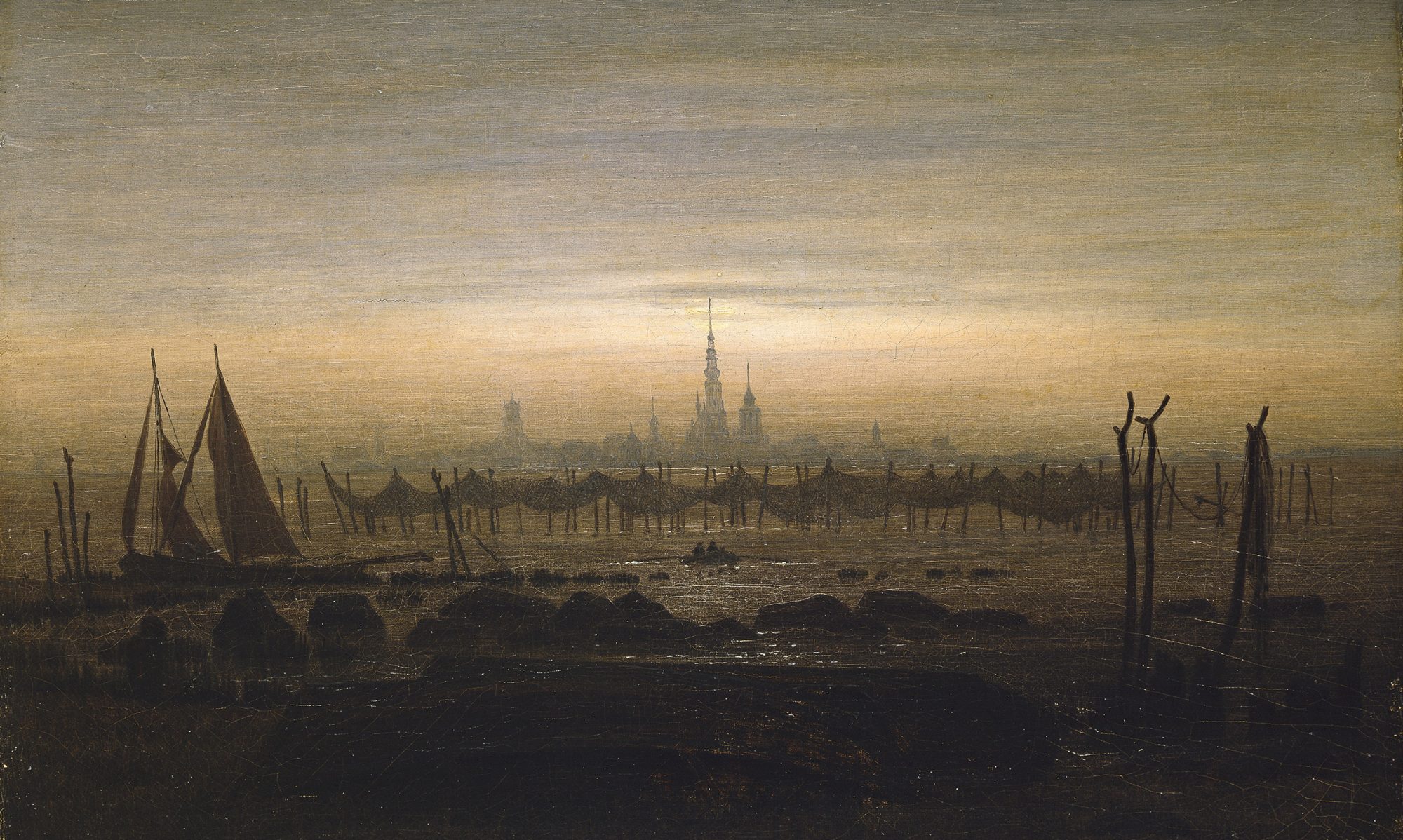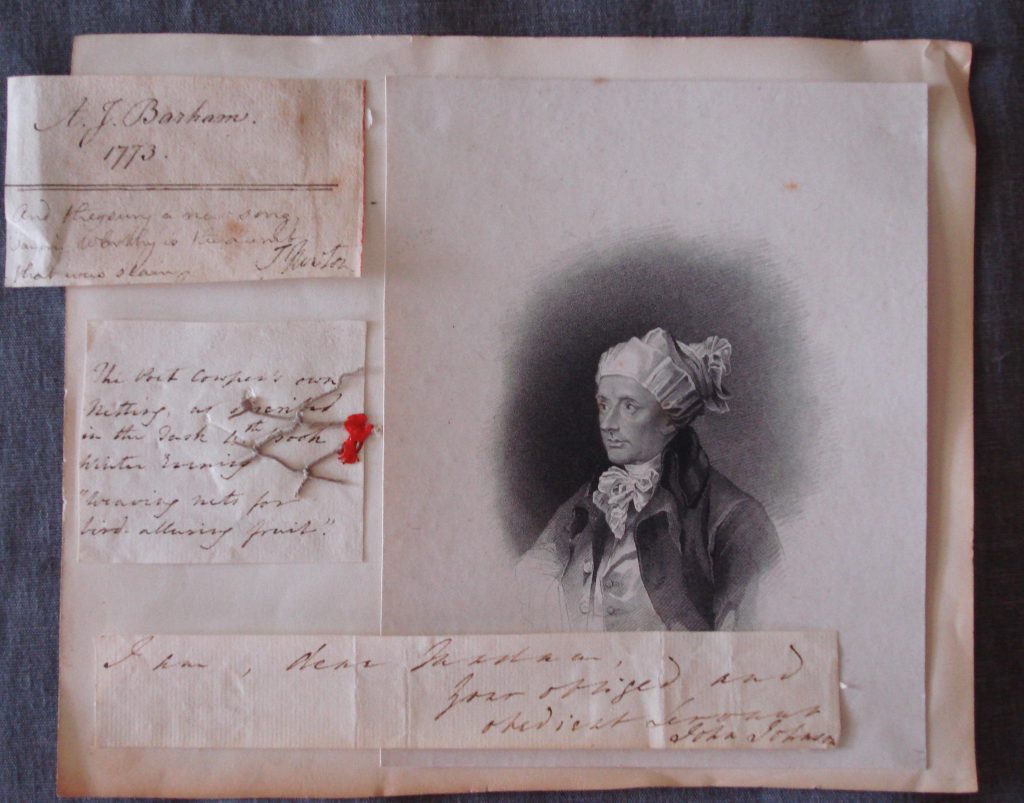Contributor: Stephen Bending
Location: unknown
Description: As a souvenir, this small square of garden netting signals the peculiarly domestic nature of William Cowper (1731-1800) as a poet. Made by Cowper and his household, the tied strands of thread seem trivial perhaps—a quirky, amusingly antiquarian delight. But that triviality is also an announcement of authenticity. In it we are given a little piece of Cowper—the net is not simply an object, but an act, a winter evening’s task, part of the fabric of Cowper’s life. The net is ephemeral (but it has lasted), domestic (but it is treasured), it is the product of careful labour, and in its small way it recognises Cowper’s garden—or any garden—as a place of tenuous and temporary delight.
Samuel Johnson’s pleasing definition of a network as ‘the intersection of interstices’ offers us an insight into the peculiar nature of nets – at once the twine and the holes between the twine, where each is as important as the other but where the net is neither one nor the other. Nets, that is, are nothing if not liminal, and they help us to understand both Cowper’s retirement and his fascination with the world from which he retired, both his sense of being a part of nature and his recognition that—like all men—he was separated from it.
Described as a ‘poet of nature’, Cowper’s poetry turns most to domesticated nature, itself—of course—one kind of definition of the garden. But what kind of garden? Should it be useful or pleasurable, self-sufficient or profitable? Might it be all of these things at different moments, and what might that say of its creator? As Cowper’s copy of The Clergyman’s Recreation (1714) insists, the garden is a place not only of creation, but of destruction, of denial as well as abundance. Weeds must be rooted out, fruit must be defended against birds. And if the dilemma for Cowper is that birds are themselves a source of joy, we might say that this parallels his awareness of pleasure in its absence, and of pleasures not yet felt. In The Task, Cowper writes of creating garden nets of a winter’s evening, and those evenings are delightful for their utility and their sociability—but delightful, too, because the thought of summer in the dead of winter may bring as much pleasure as summer itself. For Cowper, that is, we are always between states, not wholly inhabiting either one or the other: weaving nets in winter conjures up both birds and bird-alluring fruit, the cycle of seasons invites thoughts both of now and of what is to come.
The quotation accompanying the net—from The Task (1785), Book IV, ‘The Winter Evening’—signals the net’s status as a communal product made in the home, a small-scale venture promising future pleasure. But it also signals Cowper’s acute awareness of mutability and loss. For Cowper, the ‘gift’ of a winter’s night is ‘composure’,
And whether I devote thy gentle hours
To books, to music, or to the poet’s toil,
To weaving nets for bird-alluring fruit
…
I slight thee not, but make thee welcome still.
The problem for Cowper, however, is that such composure is hard-won, momentary, and subject to the disruptions of desire: desire for the easy pleasures of music or the toil of the poet, desire for leisured reading or for laboured weaving. All are welcome, but that welcome is prefaced by the complication of a double negative (‘I slight thee not’); and the need for that double negative tells us much about Cowper’s world, about composure being so valued because so often absent, about pleasures being grasped at because so fragile.
Prone to what we would now term depression, Cowper was acutely aware of changing states and altered experience. At moments that might be terrifying, as when suddenly aware (in his poem ‘The Shrubbery’) that depression cuts him off from all pleasure in the world. But running throughout Cowper’s poetry, too, is an unsettling awareness that one’s choices and desire are an account of oneself and one’s failings. In both The Task and ‘Retirement’, he repeatedly returns to the questions of profit and pleasure so central to The Clergyman’s Recreation, in part because profit holds both a biblical charge and marks a distinction between financial and spiritual wealth. Characteristically, it is in the garden that Cowper explores these ideas, because it is in the garden that one is so often confronted by them. Repeatedly, Cowper invites us to ask ourselves two questions: what do I want, and should I want it?
Those questions return us to our garden net: if the net marks out Cowper’s domestic nature, it also marks out man as separated from nature, intervening, making choices, making judgements on how—at least this part of—the world should be. For Cowper that choice is never comfortable even as he longs for comfort. His net protects one thing at the expense of another, it provides him with sustenance—both physical and mental—but denies such sustenance to other parts of the creation. Small and frail, the net announces the greater frailty of its maker, the frailty of a man remaking God’s creation in the shape of his own desires, of a man who knows his pleasures may be foolish and his choices a mistake.
Cowper wrote of his life in the country that ‘Absence of occupation is not rest … A life of ease a difficult pursuit’—and running throughout his poetry there is always that sense that mankind’s lot is to be between states, that desires are disruptive, that happiness slips from our grasp. Running through that poetry also, however, is the sheer delight of being an active part of nature and of seeing in nature the work of God. If this experience of nature is at once powerful and slight, marked as much by absence as by presence, Cowper’s garden net becomes an oddly appropriate souvenir of both the poet and the man. Diminutive and frail, it announces the one thing of which Cowper seems most certain, that in the small-scale and the domestic we most clearly understand the desires that make us who we are.
Date: ?after 1783
Creator: William Cowper /John Johnson
Subject: William Cowper
Media rights: Cowper and Newton Museum
Object type: manuscript, portrait engraving, and garden netting
Format: garden twine
Publisher: Cowper and Newton Museum

